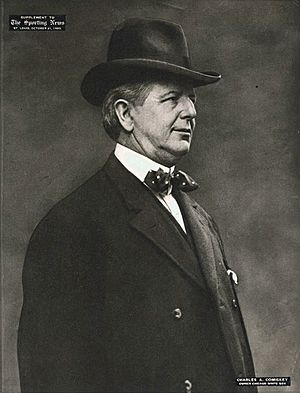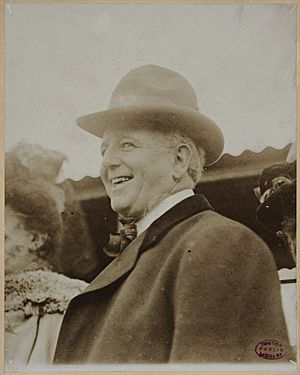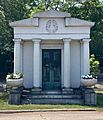Charles Comiskey facts for kids
Quick facts for kids Charles Comiskey |
|||
|---|---|---|---|

Comiskey c. 1909
|
|||
| First baseman / Manager / Owner | |||
| Born: August 15, 1859 Chicago, Illinois |
|||
| Died: October 26, 1931 (aged 72) Eagle River, Wisconsin |
|||
|
|||
| debut | |||
| May 2, 1882, for the St. Louis Brown Stockings | |||
| Last appearance | |||
| September 12, 1894, for the Cincinnati Reds | |||
| MLB statistics | |||
| Batting average | .264 | ||
| Hits | 1,530 | ||
| Runs | 994 | ||
| Stolen bases | 416 | ||
| Managerial record | 840–541 | ||
| Teams | |||
As player
As manager
As Owner
|
|||
| Career highlights and awards | |||
|
|||
| Induction | 1939 | ||
| Election Method | Veterans Committee | ||
Charles Albert Comiskey (born August 15, 1859 – died October 26, 1931) was a very important person in early American baseball. People sometimes called him "Commy" or "The Old Roman." He was a Major League Baseball player, a manager, and later, a team owner.
Comiskey helped create the American League, which is one of the two main leagues in baseball today. He also founded and owned the Chicago White Sox team. The famous baseball stadium, Comiskey Park, was built under his direction and named after him.
His reputation was affected by an event called the Black Sox Scandal. Even so, he was recognized for his contributions to baseball and was inducted into the Baseball Hall of Fame in 1939.
Contents
Early Life and Baseball Beginnings
Charles Comiskey was born in Chicago, Illinois, on August 15, 1859. His father, John Comiskey, was a politician in Illinois. Charles went to schools in Chicago and later to St. Mary's College in Kansas.
He played baseball at St. Mary's. Before becoming a full-time baseball player, he worked different jobs. These included being a plumber's helper and working in construction.
Playing and Managing Baseball
Comiskey started his baseball career as a pitcher. But after he had arm problems, he switched to playing first base. He is known for being one of the first first basemen to play a bit away from the base. This helped him cover more of the infield when a ball was hit.
In 1882, he joined the American Association with the St. Louis Brown Stockings. He soon became the team's manager. From 1885 to 1888, he led the Browns to win four championships in a row!
He also played and managed for other teams. These included the Chicago Pirates in 1890 and the Cincinnati Reds from 1892 to 1894.
Managerial Record
Here's a look at Charles Comiskey's record as a manager:
| Team | From | To | Record | ||
|---|---|---|---|---|---|
| W | L | Win % | |||
| St. Louis Browns | 1883 | 1883 | 12 | 7 | .632 |
| St. Louis Browns | 1884 | 1889 | 465 | 214 | .685 |
| Chicago Pirates | 1890 | 1890 | 75 | 62 | .547 |
| St. Louis Browns | 1891 | 1891 | 86 | 52 | .623 |
| Cincinnati Reds | 1892 | 1894 | 202 | 206 | .495 |
| Total | 840 | 541 | .608 | ||
| Ref.: | |||||
Becoming a Team Owner
After his playing and managing career, Comiskey bought a baseball team. In 1894, he moved his team from Sioux City, Iowa, to Saint Paul, Minnesota. He had a good batting average of .264 as a player. As a manager, he won 839 games and lost 542.
In 1900, Comiskey moved his team to Chicago. They became the Chicago White Stockings, which was later shortened to the Chicago White Sox. In 1901, the American League, which Comiskey helped form, declared itself a major league.
As the owner of the White Sox from 1900 until his death in 1931, Comiskey achieved a lot. He oversaw the building of Comiskey Park in 1910. His team won five American League championships and two World Series (in 1906 and 1917).
The Black Sox Scandal
Comiskey's team won the American League championship in 1919. They were set to play in the 1919 World Series. However, something very unfortunate happened. Eight players on the White Sox team were accused of planning to lose the World Series on purpose. This event became known as the Black Sox Scandal.
It was said that Comiskey was very careful with money when it came to player salaries. For example, some players made less than $3,000 a year. One pitcher, Eddie Cicotte, was promised a $10,000 bonus if he won 30 games. But when he got close, Comiskey had him benched. Comiskey said it was to protect his arm, but some thought it was to avoid paying the bonus. After winning the 1919 championship, the players were promised a bonus. It turned out to be a case of flat champagne, which disappointed them.
When the scandal became public, Comiskey suspended the players involved. He knew this would hurt his team's chances of winning again. He supported the decision by baseball commissioner Kenesaw Mountain Landis to ban the players from professional baseball forever. This meant the White Sox lost many of their best players. The team struggled for many years after that. They didn't win another championship until 1959, long after Comiskey had passed away.
Comiskey's Legacy
Charles Comiskey is remembered for several things. He is often given credit for changing how the first base position was played. He also played a big part in changing how baseball was governed.
He was inducted into the National Baseball Hall of Fame in 1939. Comiskey passed away in Eagle River, Wisconsin, in 1931. His son, J. Louis, took over the team. After J. Louis's death, his wife, Grace, managed to keep control of the team.
Later, her children, Dorothy Comiskey Rigney and Charles Albert Comiskey II, became co-owners. In 1991, when the White Sox moved to a new stadium, it was named Comiskey Park to honor him. Today, that stadium is known as Guaranteed Rate Field. You can find a statue of Charles Comiskey at the new ballpark.
Images for kids
 | Mary Eliza Mahoney |
 | Susie King Taylor |
 | Ida Gray |
 | Eliza Ann Grier |





